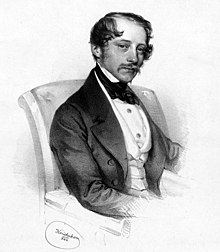Otto Nicolai: Difference between revisions
m Removing comment per https://en.wikipedia.org/w/index.php?title=Wikipedia:Bot_requests&oldid=529854896#Removal_of_comments, removed stub tag using AWB |
m Removing comment per https://en.wikipedia.org/w/index.php?title=Wikipedia:Bot_requests&oldid=529854896#Removal_of_comments using AWB |
||
| Line 1: | Line 1: | ||
<!-- please do not add an infobox, per [[Wikipedia:WikiProject Composers#Lead section]]--> |
|||
[[File:Otto Nicolai.jpg|thumb|Otto Nicolai]] |
[[File:Otto Nicolai.jpg|thumb|Otto Nicolai]] |
||
Revision as of 22:11, 26 December 2012

Carl Otto Ehrenfried Nicolai (9 June 1810 – 11 May 1849) was a German composer, conductor, and founder of the Vienna Philharmonic. Nicolai is best known for his operatic version of Shakespeare's comedy The Merry Wives of Windsor (Die lustigen Weiber von Windsor). In addition to five operas, Nicolai composed lieder, works for orchestra, chorus, ensemble, and solo instruments.
Biography
Nicolai, a child prodigy, was born in Königsberg, Prussia. He received his first musical education from his father, himself a composer and musical director, Carl Ernst Daniel Nicolai. During his childhood his parents divorced, and while still a youth, early in June 1826, Nicolai ran away from his parents' "loveless" home,[1] taking refuge in Stargard with a senior legal official called August Adler who treated the musical prodigy like a son and, when Nikolai was seventeen, sent him to Berlin to study with Carl Friedrich Zelter.
After initial successes in Germany, including his first Symphony (1831) and public concerts, he became musician to the Prussian Embassy in Rome. During the early 1840s he established himself as a major figure in the concert life of Vienna. In 1844 he was offered the position, vacated by Felix Mendelssohn, of Kapellmeister at the Berlin Cathedral; but he did not reestablish himself in Berlin until the last year of his life. On 11 May 1849, two months after the premiere of The Merry Wives of Windsor, and only two days after his appointment as Hofkapellmeister at the Berlin Staatsoper, he collapsed and died from a stroke. On the very same day of his death, he was elected a member of the Royal Prussian Academy of Arts.
Works
Operas
| Title | Genre | Subdivisions | Libretto | Composition | Première date | Place, theatre |
|---|---|---|---|---|---|---|
| La figlia abbandonata | 1837 | unfinished | ||||
| Rosmonda d'Inghilterra (given at the first performance as: Enrico II) | melodramma serio | 2 acts | Felice Romani | 1837–1838 | 26 November 1839 | Trieste, Teatro Grande |
| Il templario | melodramma | 3 acts | Girolamo Maria Marini, after Walter Scott | 1839–1840 | 11 February 1840 | Turin, Teatro Regio |
| Gildippe ed Odoardo | melodramma | 3 acts | Temistocle Solera | 1840 | 26 December 1840 | Genoa |
| Il proscritto | 3 acts | Gaetano Rossi | 1841 | 13 March 1841 | Milan, La Scala | |
| Die Heimkehr des Verbannten (revision of Il proscritto) | tragische Oper | 3 acts | Siegfried Kapper | 1843 | 3 February 1844 | Vienna, Theater am Kärntnertor |
| Der Tempelritter (revision of Il templario) | 3 acts | Siegfried Kapper | 1845 | 20 December 1845 | Vienna, Theater am Kärntnertor | |
| Die lustigen Weiber von Windsor | komische-fantastische Oper | 3 acts | Salomon Hermann Mosenthal, after William Shakespeare, The Merry Wives of Windsor | 1845–1846 | 9 March 1849 | Berlin, Hofopera |
Other
- 6 four-part unaccompanied lieder, Op. 6
- Variazioni concertanti su motivi favoriti dell'opera La sonnambula di Bellini, Op. 26, for soprano, horn and piano (or cello or clarinet) (republished in 2000 by edition mf)
- Die Thräne, Op. 30, (voice, horn and piano; republished in 1999 by "edition mf").
- Ecclesiastical Festival Overture on the chorale "Ein feste Burg ist unser Gott", Op. 31
- Pater noster, Op. 33, for two mixed choirs (SATB/SATB) a cappella with soloists (SATB/SATB). Published by Schott Music in 1999.
- Der dritte Psalm (Psalm 3) for alto solo. (Manuscript at Library of Congress.)
- 6 sonatas for 2 horns: from the Handel Knot-Farquharson Cousins ms (re(?)published by Edition Kunzelmann in 1977.)
- Mass in D major (1832/1845). (Recorded on the label Koch Schwann in 1981, subsequently reissued on compact disc. Re?Published by Augsburg : A. Böhm in 1986.)
- Te Deum; Psalm 97, Der Herr ist König; Psalm 31, Herr, auf Dich traue ich; Ehre sei Gott in der Höhe (psalm and liturgical settings recorded also on Koch Schwann. Te Deum was also recorded on Deutsche Grammophon Gesellschaft LPM 39,170 in 1966.) Psalms 31 & 97 published by Bote & Bock of Berlin in 1977.
- two symphonies: No. 1 (1831) and No. 2 in D (1835, rev. 1845)
References
- This article incorporates text from a publication now in the public domain: Chisholm, Hugh, ed. (1911). "Nicolai Otto". [[Encyclopædia Britannica Eleventh Edition|Encyclopædia Britannica]] (11th ed.). Cambridge University Press.
{{cite encyclopedia}}: URL–wikilink conflict (help) - Nicolai, Otto (1892). Otto Nicolais Tagebücher nebst biographischen Ergänzungen (in German). Leipzig: Breitkopf & Härtel. OCLC 17601836.
{{cite book}}: Unknown parameter|coauthors=ignored (|author=suggested) (help) - Nicolai, Otto (1924). Otto Nicolai, Briefe an seinen Vater, soweit erhalten (in German). Regensburg: G. Bosse. OCLC 3463501.
{{cite book}}: Unknown parameter|coauthors=ignored (|author=suggested) (help) - Sadie, Stanley (1992). Nicolai, Carl Otto Ehrenfried in The New Grove Dictionary of Opera. Grove's Dictionaries of Music. ISBN 0-333-73432-7.
{{cite book}}: Unknown parameter|coauthors=ignored (|author=suggested) (help)
- ^ http://www.ostdeutsche-biographie.de/nicoot99.htm Biographical on-line note (in German)
External links
- Otto Nicolai operas at Karadar.com
- Otto Nicolai biography and timeline at MusicWeb Classpedia
- Free scores by Otto Nicolai at the International Music Score Library Project (IMSLP)
- Otto Nicolai at AllMusic
- Otto Nicolai at IMDb
- Otto Nicolai at Find a Grave

